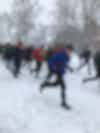2020 Frozen Otter Ultra
By: Bruce Atwood
I had a glimmer of hope about finishing the Frozen Otter this year, but alas the weather defeated me. The Frozen Otter is a 64-mile ultra run held in January along the Ice Age Trail in the Northern Unit of the Kettle Moraine State Forest in Wisconsin. There is a 24-hour time limit to complete the race, and there are additional time limits at checkpoints, approximately 8 miles apart, along the way. Water and snacks are available at the checkpoints, but otherwise the race is unsupported. Thus everyone must wear a pack with food, extra clothing, cell phone, and other gear such as microspikes and trekking poles.
Historically the “frozen few” finish rate is less than 20%: in 2019, there were 33 finishers out of 127; and in 2018, 40 out of 124 completed the race. Last year I made it 46 miles when I stopped about 2am. The previous year I only made it 32 miles, and the year before that I paced a friend for 23 miles. This year I incorporated much more hiking into my training, which I built up to 50 miles per week of combined running and hiking. I’ll have to admit that discovering the Dunkin Donuts for munchkins and hot chocolate at 8 miles out on the Northern Rail Trail gave my training a significant boost.
The forecast of temperatures dropping into the single digits with winds over 20 miles per hour was very close to the minus 20 wind chill that would trigger the requirement to carry extra extreme weather gear. It may not sound like a lot to carry a sleeping bag and bivy sack, but every extra pound slows you down. We were glad that extreme gear was not needed, but we all knew the weather conditions were going to be tough this year at the Frozen Otter. And, sure enough, in the end, only 5 people finished out of 112 participants.
So what happened this year? We woke up to 6 inches of new snow on top of the 4 inches already on the trail. At the 10 am start the temperature was 31 degrees with a 12 mph wind. I expected very soft conditions and decided that microspikes would not give enough additional traction to be worth their weight. Thus I left them in my drop box which could only be accessed at 46 miles. I was wrong though as the wet snow packed down into a hard slippery surface for the first 5 miles, but I don’t think this mistake made much of a difference in my pace.
The temperature decreased and the wind increased all day. For the first 16 miles I was moving along slowly but steadily. I realized that I might eventually have trouble with the time cutoffs, but I paced myself by effort not time since I was planning for a very long day. As the packed down trail began getting drifted over and very soft, I began to slow dramatically. I hadn’t been using my trekking poles since I was saving them for later when I knew I would really need them. In retrospect I should have gotten them out at this point.
By 7 pm the temperature had dropped to 14 degrees and the wind had picked up to 22 mph making for a minus 5 windchill. I planned to change socks, change to thicker baselayers, warmer gloves, and balaclava at the mile 23 checkpoint. Unfortunately I rolled in at 7:10 pm and the cutoff was 7 pm. My 2020 Frozen Otter was over.
For those who continued, by midnight the temperature was down to 6 degrees and the windchill to minus 15. The 20 mph winds were drifting snow over the trail which made the snow softer and softer. The snow and cold led to continued attrition until only 5 made it to the finish.
I’ll admit to some disappointment that I didn’t make it further than 23 miles, but it was a fun challenge. There is a very high degree of camaraderie and wonderful volunteers at this race. Thanks to UVRC members Bill Young, Betsy & Mike Gonnerman, and Alan Callaway for helping me with my training.
Anyone want to join me next year?






